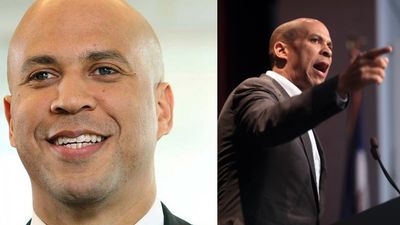When America's Apollo 11 space flight landed the first men on the moon in 1969, the program cost a whopping $25.4 billion (PDF), $18 billion more than was initially estimated.
One year earlier, Echol Cole and Robert Walker, two African-American sanitation workers in Memphis, died after falling into a garbage packer. For their labors in the dangerous, unhealthy, difficult field that was Memphis sanitation work, Cole and Walker were paid about $1.80 an hour. Their deaths prompted the famed Memphis Sanitation Strike, for which Martin Luther King Jr. came to Tennessee, only to be gunned down by James Earl Ray.
What do these two incidents have to do with each other? Since its inception, the nation's space program has aimed for the furthest reaches of the universe while people on Earth are literally treated like garbage. I won't be sad to see it go.
A lot of people are furious that Obama has canceled the Constellation program for manned space flight, despite the fact that he also increased NASA's budget by $6 billion over the next five years (though large, that increase wasn't enough to fund Constellation). What's more, India has now said it would like to do its own manned mission to space by 2016. Cosmos-minded fearmongers are now predicting that America's space program, long the world's best, will soon be second- or even third-rate. "Without the skill and experience that actual spacecraft operation provides," wrote three commanders of U.S. moon missions in a letter to Obama, "the USA is far too likely to be on a long downhill slide to mediocrity. America must decide if it wishes to remain a leader in space. If it does, we should institute a program which will give us the very best chance of achieving that goal."
If the letter sounds familiar, that's because its rah-rah platitudes are the same as those issued by John F. Kennedy in 1961, when he promised the nation that America would have a man on the moon within nine years. The difference is that back then the bogeyman wasn't India but the Soviet Union, and so began the space race—the most expensive pissing contest ever devised.
If anyone tells you one of the main thrusts behind America's first multi-billion dollar leap into orbit wasn't the desire to "beat" the communist Soviets, they are lying. That's not to say important scientific knowledge didn't spring from that first flight, but the space program's ensuing years have often echoed the juvenile contest at its foundation. Read the Apollo commanders' letter to Obama yourself; in several paragraphs the astronauts mention very little about the practical uses of the Constellation program, instead mentioning time and again that America is in danger of not winning and becoming "mediocre."
Of course there are practical, terrestrial applications for space technology. And because of this, nobody is suggesting that we stop studying space altogether. What I am suggesting—and what Obama's space plan underscores—is that we needn't send more costly, manned missions to the moon in order to glean valuable knowledge from space. Though he terminated Constellation, Obama extended the life of the International Space Station until at least 2020. He has also devoted $3 billion to the design of a Shuttle-Derived Heavy Lift Launch Vehicle, "a vehicle to efficiently send into orbit the crew capsules, propulsion systems, and large quantities of supplies needed to reach deep space." The president isn't shutting down NASA; he's just sidelining some of NASA's least cost-efficient programs in a time of extreme economic duress. Annalee Newitz of the science blog io9 even says she's feeling "optimistic" about Obama's space plans, even without the Constellation Program. "The budget junks a backward-looking program and funds a brand-new one that will focus on developing new space technologies, exploring the solar system with robots, and pushing humans closer to living offworld," she writes.
Following the 1961 speech that kicked off the space race, Kennedy gave a different space speech in 1962 in Houston, Texas. "Many years ago the great British explorer George Mallory, who was to die on Mount Everest, was asked why did he want to climb it. He said, 'Because it is there,'" said Kennedy. "Well, space is there, and we're going to climb it, and the moon and the planets are there, and new hopes for knowledge and peace are there."
While we tighten our national belt and watch the space shuttle Endeavour take its final flight, it's important to keep in mind that space is indeed there, but it's not going anywhere. It's not a bad thing to focus resources elsewhere for the time being. To be frank, I'd much rather see us prevent poor people from falling into garbage compactors than look at another pretty picture from the moon.












